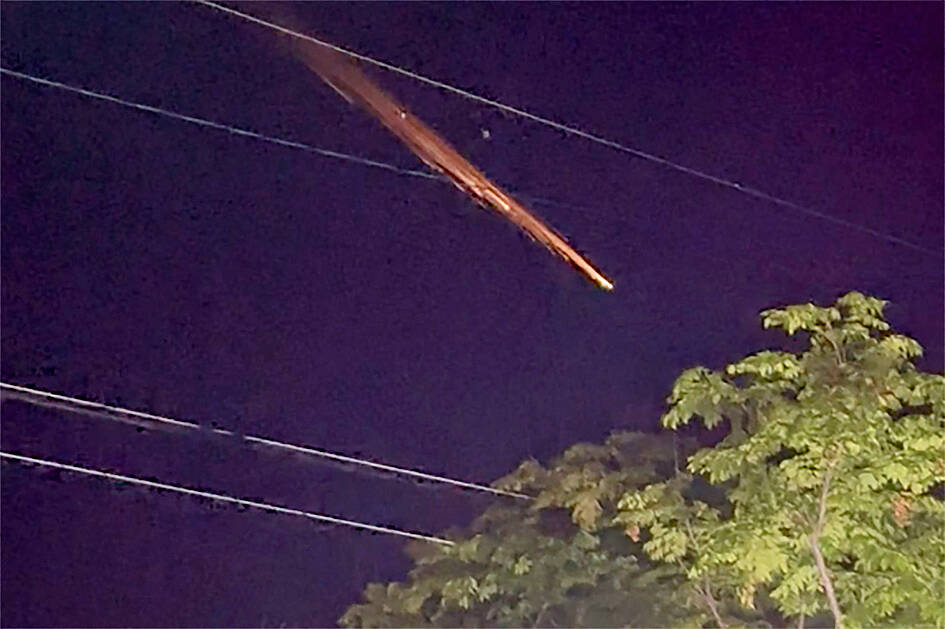Fiery streaks of light across the night sky over southern Japan might have been caused by space debris from a rocket launched by China, Japanese officials said yesterday.
Video of the apparent fireballs lit up social media on Wednesday night, with people speculating on what might have caused the unusual display.
The National Astronomical Observatory of Japan’s Ishigaki branch in Okinawa said that it observed the streaks of light at 8:33pm on Wednesday, an official told reporters.

Photo: AFP / Courtesy of Twitter user shokosan
“Given the information publicly available, we think the falling objects are not fireballs from meteorites, but debris from a rocket,” said an observatory official, who declined to be named.
“The slow speed and the way the light moved — threads of lights moving in parallel — looked exactly like the atmospheric entry of debris from a rocket,” he said.
“It is possible that [it was] debris from a rocket that was launched by China in November,” he said.
“There is information that part of the rocket was expected to re-enter the atmosphere” at around this time, he added.
The debris was likely to have fallen into the ocean and posed no danger, he said, citing predictions of the route it would have taken.
“It was beautiful, it looked like a weeping cherry blossom tree, but it’s good to know it wasn’t something dangerous,” one person wrote on Twitter of the display.

Former Nicaraguan president Violeta Chamorro, who brought peace to Nicaragua after years of war and was the first woman elected president in the Americas, died on Saturday at the age of 95, her family said. Chamorro, who ruled the poor Central American country from 1990 to 1997, “died in peace, surrounded by the affection and love of her children,” said a statement issued by her four children. As president, Chamorro ended a civil war that had raged for much of the 1980s as US-backed rebels known as the “Contras” fought the leftist Sandinista government. That conflict made Nicaragua one of

COMPETITION: The US and Russia make up about 90 percent of the world stockpile and are adding new versions, while China’s nuclear force is steadily rising, SIPRI said Most of the world’s nuclear-armed states continued to modernize their arsenals last year, setting the stage for a new nuclear arms race, the Stockholm International Peace Research Institute (SIPRI) said yesterday. Nuclear powers including the US and Russia — which account for about 90 percent of the world’s stockpile — had spent time last year “upgrading existing weapons and adding newer versions,” researchers said. Since the end of the Cold War, old warheads have generally been dismantled quicker than new ones have been deployed, resulting in a decrease in the overall number of warheads. However, SIPRI said that the trend was likely

NUCLEAR WARNING: Elites are carelessly fomenting fear and tensions between nuclear powers, perhaps because they have access to shelters, Tulsi Gabbard said After a trip to Hiroshima, US Director of National Intelligence Tulsi Gabbard on Tuesday warned that “warmongers” were pushing the world to the brink of nuclear war. Gabbard did not specify her concerns. Gabbard posted on social media a video of grisly footage from the world’s first nuclear attack and of her staring reflectively at the Hiroshima Peace Memorial. On Aug. 6, 1945, the US obliterated Hiroshima, killing 140,000 people in the explosion and by the end of the year from the uranium bomb’s effects. Three days later, a US plane dropped a plutonium bomb on Nagasaki, leaving abut 74,000 people dead by the

Indian Prime Minister Narendra Modi is to visit Canada next week, his first since relations plummeted after the assassination of a Canadian Sikh separatist in Vancouver, triggering diplomatic expulsions and hitting trade. Analysts hope it is a step toward repairing ties that soured in 2023, after then-Canadian prime minister Justin Trudeau pointed the finger at New Delhi’s involvement in murdering Hardeep Singh Nijjar, claims India furiously denied. An invitation extended by new Canadian Prime Minister Mark Carney to Modi to attend the G7 leaders summit in Canada offers a chance to “reset” relations, former Indian diplomat Harsh Vardhan Shringla said. “This is a